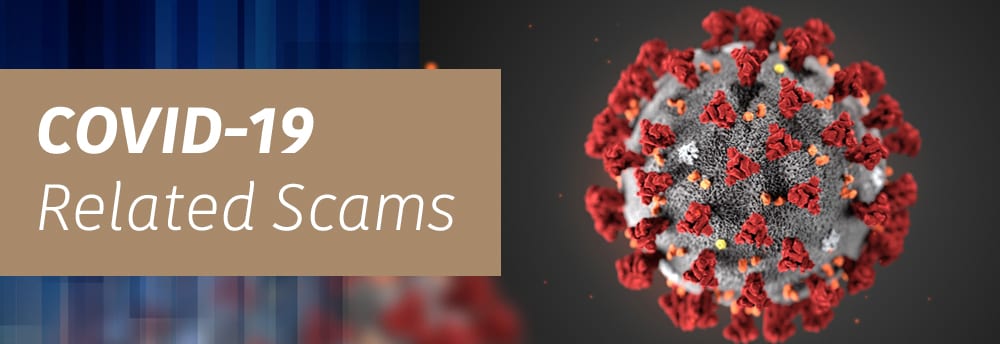
As the number of COVID-19 cases rises, so do the scams. There is currently no cure for COVID-19. Scam artists are using social media, unsolicited phone calls, texts and emails preying on people’s anxiety about health preparedness, vaccine efficacy and mask wearing.
Although the Centers for Disease Control (CDC) and other public health officials MAY contact you if they believe you may have been exposed to the virus, they will NOT need to ask you for insurance or financial information.
COVID-19 Related Scams
FAKE DOCUMENTATION
Don’t Buy Fake COVID-19 Vaccine Cards or Negative Test Results – Here’s Why
SCAMS TARGETING GRIEVING FAMILIES
LOVED ONE IN NEED SCAM
Beware of a call from an alleged healthcare worker claiming one of your loved ones is sick in the hospital with COVID-19 and your health insurance was cancelled, and you can pay over the phone to reinstate coverage and receive needed treatment.
BOGUS COVID-19 INSURANCE POLICIES
Another Scam- Bogus agents claiming to be insurance agents selling COVID-19 insurance policies. There are no specific policies for COVID-19. Contact a licensed health insurance agent near you.
BOGUS TRAVEL INSURANCE
Most travel insurance policies do not cover viral outbreaks or pandemics. Be wary of anyone trying to sell you travel insurance that claims to cover COVID-19.
CYBER SCAMS
Unfortunately, cyber criminals are using the Coronavirus pandemic as a new way to take advantage of people and gain access to their money, passwords and other sensitive information. Check the National Association of Insurance Commissioners (NAIC) for precautions you can take to spot and stop scammers before it’s too late.
SCAMS TARGETING SENIORS
Scams targeting seniors are attempting to get Medicare numbers so fraudsters can later make bogus claims against the senior’s Medicare account. Do not give out your Medicare number, Social Security number or Personal information to anyone.
We are getting reports that scammers are calling, texting, emailing AND even going door to door offering testing, supplies or treatments. If you have any questions, you can reach out to the Medicare Assistance Program at the Oklahoma Insurance Department at 800-763-2828 or visit their page.
FRAUD ALERTS: COVID-19 SCAMS
How to Protect Yourself
- Ignore low-cost insurance or other suspicious deals.
- Reject sales pitches contacting you without your prior consent … or telling you to press “1” or another key to be removed from a call list.
- Ignore pitches for Coronavirus or COVID-19 insurance or home testing kits. ALL are bogus.
- Do not pick up the phone if it’s from an unknown number. Just hang up if you do answer; do not engage the caller.
- Avoid clicking links or downloading files from unfamiliar sources. Watch for typos in the messages.
- Report suspicious calls to the Federal Trade Commission.
